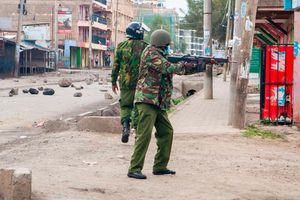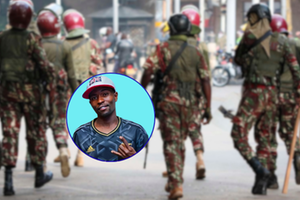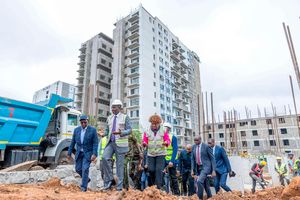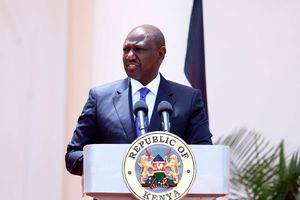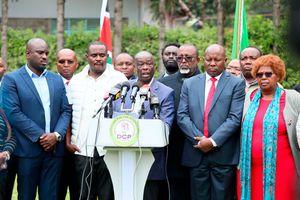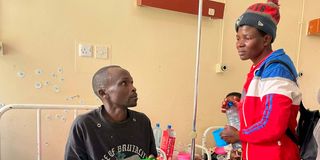
Jacinta Nekesa with her husband Geoffrey Mugendi at Kiambu Level 5 Hospital on July 10, 2025. Geoffrey Mugendi was injured by a bullet during the Saba Saba protest, which resulted in the amputation of his leg.
What began as a routine walk home after a long day’s work turned into a life-altering tragedy for Geoffrey Mugendi , a 40-year-old carpenter from Thindigua in Kiambu County.
He is now learning to live with one leg after being shot during Monday’s Saba Saba protests.
Mr Mugendi told Nation that at around 4.30 pm, he was heading home from a construction site five kilometers away, carrying a sack of carpentry tools on his back.
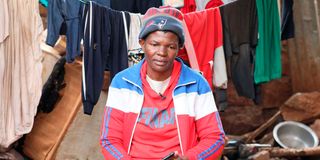
Jacinta Nekesa during an interview at Thindigua in Kiambu County on July 10, 2025. Her husband, Geoffrey Mugendi, was injured by a stray bullet, which resulted in the amputation of his leg.
As he approached Thindigua Road, he unknowingly walked into a confrontation between protesting youths and heavily armed police officers.
Before he could understand what was happening, a sharp pain tore through his right leg. Witnesses said he collapsed immediately and lost consciousness amid the chaos and a group of youths quickly came to his aid.
“He was not even part of the protest,” said a boda boda rider who helped rush him to hospital. “He was simply in the wrong place at the wrong time.”
In the aftermath, his wife Jacinta Nekesa described how their lives were turned upside down.
Speaking from their small one-bedroom home in Thindigua’s informal settlement, she said their two daughters are struggling to understand what happened to their father.
Mr Mugendi was the family's sole breadwinner and on the day he was shot, he had gone out in search of casual work to raise school fees.
“They keep asking where their dad is. Neighbours told them he was shot, so now they want to see him,” she said.
At Kiambu Level 5 Hospital where he is recovering, Mr Mugendi said doctors told the family his injuries were too severe. The bullet had shattered major bones and ruptured key blood vessels in his right leg.
Surgeons were forced to amputate the leg above the knee to save his life.
“Sometimes I sleep and wake up hoping it was a dream only to remember I no longer have one of my legs. It is a reality I’m trying to accept,” he said.
Mr Mugendi remains hopeful that he will get justice after his recovery.
Devastating news
His wife struggled to hold back tears as she recalled receiving the news. “I got a call saying he was shot and I could not believe it. When I arrived at the hospital, the doctors told me they had no choice but to amputate. We are devastated as a family,” she said.
Now unable to work, Mr Mugendi's once-reliable carpentry tools sit unused at home and his family is facing a bleak future.
“He built furniture, repaired roofs and he always found a way to bring something home. Now we don’t know how we’ll survive,” said his wife.
On the same day, another man, Melkizedek Muchesia, narrowly escaped the same fate. A bullet grazed just above his head leaving him shaken and with a bandaged wound.
“I thank God I’m alive. It was terrifying. That bullet could have killed me,” said Muchesia.
He condemned President William Ruto’s directive for police to shoot protesters in the leg calling it unconstitutional and dangerous.
“If someone is breaking the law, they should be arrested and taken to court—not shot. It’s illegal and inhumane,” he said.

